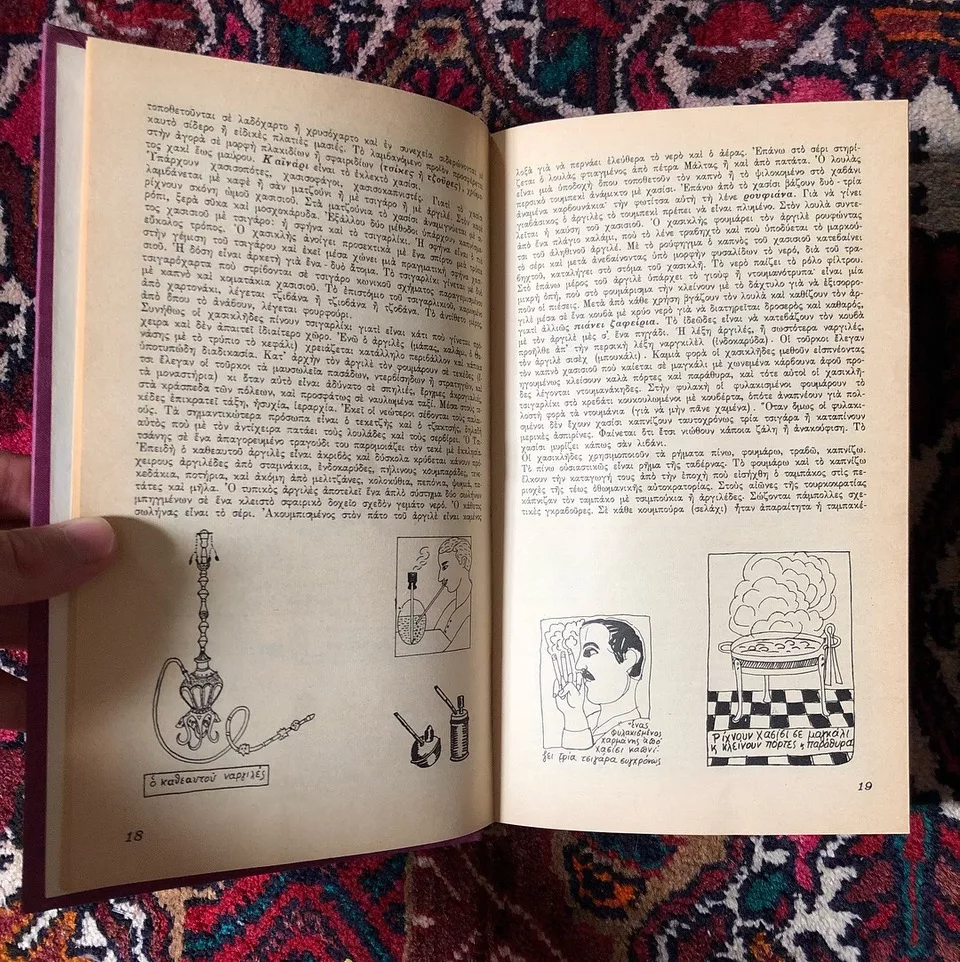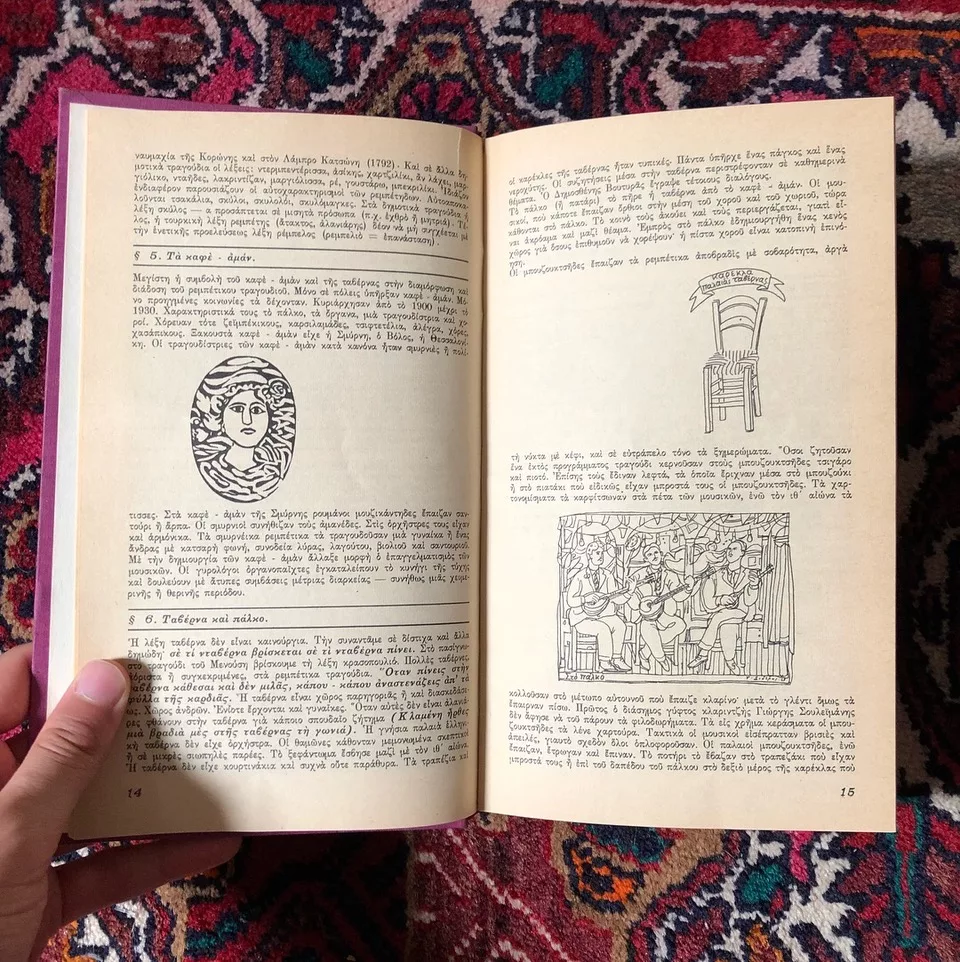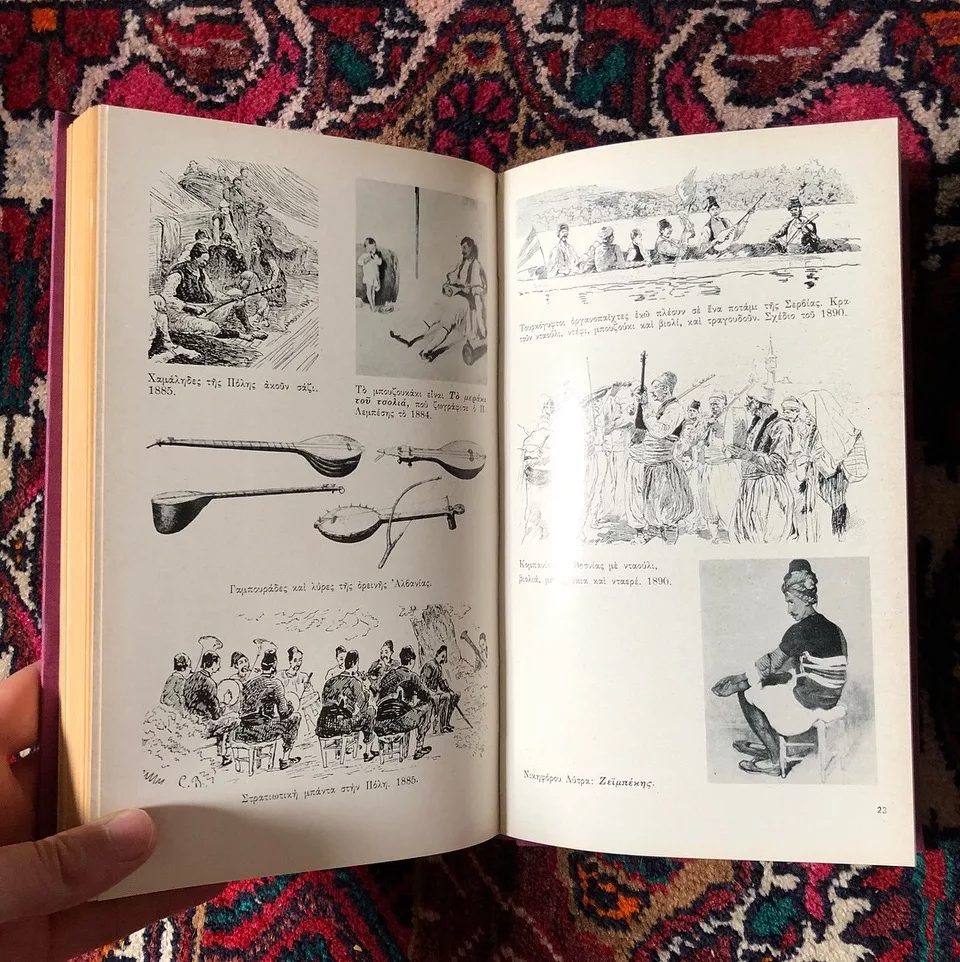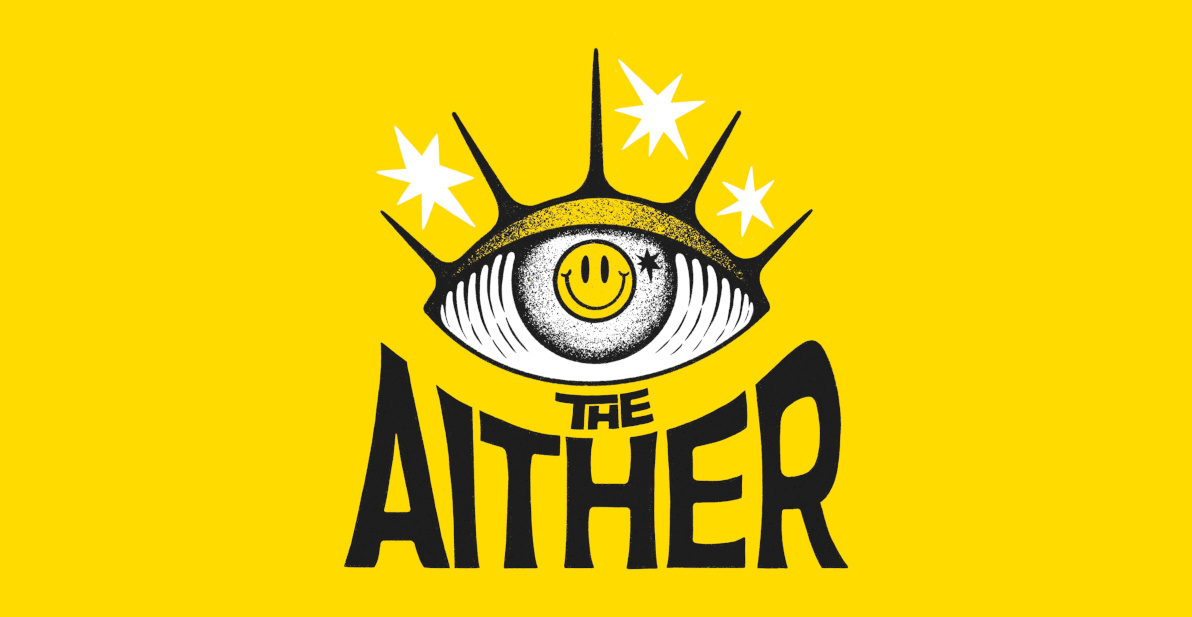- Author = John Taylor
- Title = ‘Harsh Out of Tenderness: The Greek Poet & Urban Folklorist Elias Petropoulos’
- Publisher = Cycladic Press (from Sydney, Australia)
- Released = 2020
- ISBN = 978-0-646-81566-4
- Retail price = $26.00 (AUD.)
- Pages = 306 (with black and white illustrations.)
- Cover art = Dimitris Souliotis

Year unknown.
The term folklorist is an interesting one. Elias Petropoulos prefers the Greek iteration lagraphos, and we see the term evolving to refer to a critic and commentator who weaves in and out of cultures and subcultures, leaving reflections and notes on every facet of society.
In the newly published book Harsh Out All Tenderness, (Cycladic Press, Sydney, 2020) author John Taylor presents a fascinating compendium of Petropoulos’ thoughts, oddities and work, alongside affectionate reminisces of the author, who died in Paris in 2003.
Taylor’s presentation concerns a folklorist of infinite possibility, and we see daily life reflected upon; the thrilling and not-so-thrilling experience of the everyday – but also of grandiose events, and of course the arguably taboo.
As the exuberant introduction by Taylor states “Petropoulos had wide-open eyes and he opened eyes”, and his reflections included topics as varied and evocative as shadow theatre, condoms, lice, and smoking to name just a few.
Petropolous published one of the first books listing gay slang, and dedicated many books to the humble doorway, balcony and various remnants of Greek architectural salvage.
Roland Barthes’ Mythologies reflects similarly upon both the banal and the grandiose, marking both cultural events as wrestling and the consumption of milk as the subject of great interest and anthropology. Petropoulos frames such pictures in a Greek context, and whose body of work spans over 70 books(!), forming en masse a productive output of a literature that could be described as an ‘archive of everything’.
Arguably, everyone is a folklorist.
We all think about and reflect on objects, culture, history, behaviour, senses of nationhood and human behaviour. But only some choose to write it down. One of the reasons why this writing is so treasured as it is illuminating, as it’s inherent function is completely relatable.
Of course the output is of stark difference to our contemporary context, enlarging the curiosity of the reader.
Petropoulos was imprisoned throughout the 1960s, during the Junta, and many times throughout his career in Greece, the country of his birth. At this time many literary figures were imprisoned – the result of publishing material which did not suit the regime.
Petropoulos was held as a common criminal, rather than a political prisoner – something of which he relished as he wanted no differentiation from others.
A self proclaimed atheist, with no clear aspirations apart from anarchism, Petropolous was humorously only allowed to read the bible in his cell. His time was not lost in prison and of course Petropolous added much to his writings, expanding his thoughts and reflections to prison life and the experience and outlook of the common criminal. The arduous nature of captivity and the dualistic drama and apathy of prison life was immortalised within his ever expanding folklore repository.
Upon uncertain freedom, and undoubtedly to avoid further imminent threats of holding, Petropoulos moved to Paris where he was – as an exile – able to experience and exhibit more creative freedom than in his homeland.
(Photos of the first edition – published in 1968 – of Elias Petropoulos’ book on rebetika.
From the collection of Cycladic Press owner – Michael Alexandratos.)




In a characteristic vignette style, Taylor expresses many characteristic incidents – such as his evading of French officials through travelling first class on public transport (he was essentially an illegal exile, unable to return to Greece to possibly face impending charges). Taylor also delicately reveals his eccentric charisma and often contradictory shyness, a human of efficacy and boldness in equal measure.
I’m not sure if the relationship here is of mentee / mentor, eccentric older friend, authors with mutual respect or all of the above, but Taylor’s sentimentality and power of recount of the curious experiences throughout their working relationship becomes folklore on their own.
Despite being so omnipresent, Petropoulous appears enigmatic throughout the book. We do get a sense of this interesting author through his thoughts and writings, but Petropolous somehow remains elusive in a way almost indescribable. Perhaps that is the author’s intention – they wish to be “known” through their work, that’s all.
But as the only material in English to be published thus far, and as a volume that is both compendium and anthology but also fractured biography, perhaps it is just the context rather than content.
Quite possibly it is the best introduction to a life’s work that leaves us wanting to know more, like all good folklore, right?
John Taylor refers to Petropolous’s interest in Greek life and culture as an interlocking cultural mosaic, which is of supreme interest in the sense of the inception of this project and final product. That being – Taylor’s account as an American in Paris meeting an exiled Greek, and the resulting book: Harsh Out of Tenderness, published by a young second generation Greek-Australian (Michael Alexandratos of Cyladiac Press).
The author and publisher brought together across continents through a shared love of Rebetika music (Alexandratos has also published their own book, aptly titled within the context of this paragraph as Queerbetika). Indeed, the concept of the cultural mosaic pervades throughout our current day, residing amongst serendipity and wavering worlds between inception and production, particularly entering further into the electronic age.

Alexandros states that he started Cycladiac Press with a desire to publish on a broad range of topics within Modern Greek culture and studies, an outlet for book projects that would not otherwise interest commercial publishers with a strong focus on the obscure and esoteric. Alexandros’s personal interest is in varying yet interconnected worlds of rebetika, queer/LGBT material, laography (folklore), outsider art and poetry.
The book is a strong statement from a relatively new, young publisher, and I look forward to seeing where Alexandros will direct its output into the future.
In a post-COVID world, it feels both strangely astute and timely that a book has been published of such calibre- that is through a chance meeting (a classified advertisement responding to a request for a translator in this case.) This serendipity perhaps is something that our current situation makes all the more difficult.
Even so, during these times, we have had to seek wonder in the intricate, wonder in the small – and this exactly is what Petropoulos does. He finds things overlooked, unconsidered, and deeply considers them. He also goes further than most, curiously dedicating whole volumes to their existence and study. Exactly like an urban anthropologist, the work that remains illuminates entire worlds – worlds both unknown and eerily familiar.
Angela Garrick 2020
(Below is a 2020 video of John Taylor reading an excerpt of ‘Harsh out of Tenderness.’)
Links
- ‘Harsh Out All Tenderness’ – Link to Purchase the Book
- John Taylor – Website
- Elias Petropoulos – Goodreads page
- Elias Petropoulos – 2003 Obituary Published by The Guardian
- Elias Petropoulos – Facebook Account Devoted to His Memory
- Elias Petropoulos – Facebook Group Devoted to His Memory
- Cycladic Press – Website
- Dimitris Souliotis – Website
- Michael Alexandratos (Cycladic Press Owner) – 2019 Interview with The Aither
- Angela Garrick – Website
- Angela Garrick – ‘The Aither’ Interview from Feb. 2020

![Book Review – ‘Harsh Out of Tenderness: The Greek Poet & Urban Folklorist Elias Petropoulos’ by John Taylor [Cyladiac Press, Sydney, 2020]](https://theaither.com/wp-content/uploads/2020/11/Harsh-out-of-Tenderness-Cover-Med-jpg.webp)



![Book Review – ‘Neo-Decadence: 12 Manifestos’; Edited By Justin Isis [Snuggly Books, 2021] (Featuring Writing By Ramon Alanis, Arturo Calderon, Brendan Connell, Quentin S. Crisp, Paul Cunningham,Hadrian Flyte, Justin Isis, LC Von Hessen, Gaurav Monga, Damian Murphy, Jeremy Reed, Colby Smith + Sailor Stephens.)](https://theaither.com/wp-content/uploads/2021/02/Neo-Decadence-12-Manifestos-Cover-Cropped-Med-jpg-218x264.webp)